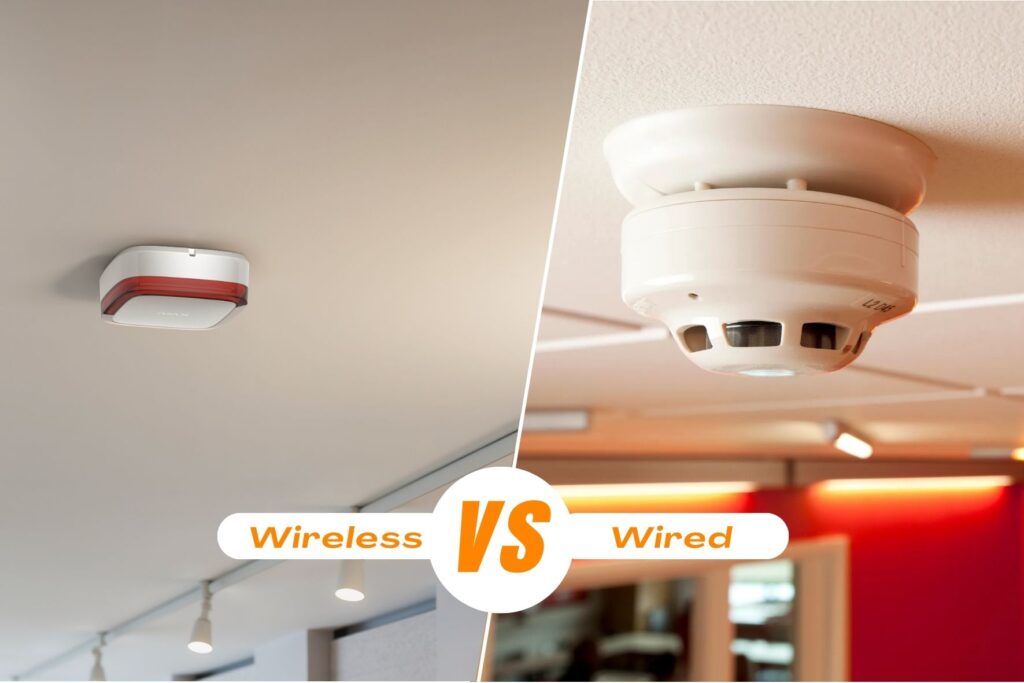Wireless vs Wired Fire Alarms | Which is Right for Your Business?
10th September 2025

Fire safety is a key responsibility for any organisation. Regardless of the premises you operate, your fire alarm system is a vital part of compliance and protection. The right choice can prevent disruption, reduce risk, and keep people safe, while the wrong one could expose you to regulatory breaches and unnecessary costs.
One of the most common questions businesses face when upgrading or installing a system is whether they should choose a wired or wireless fire alarm system. Both have advantages and both meet UK compliance standards, but they differ in installation, flexibility, and long-term costs.
This guide explains the differences, benefits, and limitations of each option, and explores which environments they are best suited for.
What Are Wired Fire Alarms?
Wired fire alarms are the traditional choice. They connect detectors, call points, and sounders with cabling, powered centrally through a control panel. For decades, they have been the benchmark for reliability and compliance in critical environments.
Benefits of Wired Fire Alarms
The technology powering wired fire alarms is older, has been around much longer and has more research and development behind it. By choosing a wired fire alarm system, you’ll benefit from:
- High reliability – because devices are connected via cable, the risk of interference or signal loss is minimal.
- Lower long-term costs – no batteries to monitor or replace across multiple devices.
- Better Compliance – particularly aligned with BS 5839 and healthcare fire safety standards such as the HTM series, which make them the default in hospitals and clinics.
- Durability – when installed professionally, wired systems can deliver dependable performance for many years.
Things to Consider
Despite the many benefits of the tried-and-tested wired fire alarm, there are some drawback you should be aware of when considering them:
- Installation requires cabling, which can be disruptive to operations, especially in live healthcare or industrial settings.
- The upfront cost is usually higher than wireless, as it involves more labour and materials.
- Once installed, the system is less flexible. Making changes or expansions to a wired setup can be complex and costly.
Which Buildings are Wired Fire Alarms Best For?
Wired systems are best environments such as healthcare, where compliance and patient safety are critical, large industrial facilities where robust performance is non-negotiable and new-builds where cabling can be integrated from the outset.
What Are Wireless Fire Alarms?
Wireless fire alarm systems use radio signals to connect devices to the control panel. Each detector or sounder is powered by a long-life battery. In recent years, wireless systems have grown in popularity thanks to their flexibility and speed of installation.
Benefits of Wireless Fire Alarms
Wireless fire alarms are a relatively new technology when compared to their wired counterparts. They offer a number of benefits which are of interest to many businesses:
- Quick installation – without cabling, installation is faster and less disruptive. This is particularly valuable for live sites where downtime is expensive.
- Flexibility – devices can be moved or added easily if your site layout changes.
- Minimal disruption to buildings – especially important for heritage or listed properties where drilling and cabling may not be permitted.
- Lower upfront installation cost – generally cheaper to install initially compared to wired systems.
Things to Consider
Wireless alarms offer greater convenience than wired systems, but there are several things to be aware of:
- Each device is powered by a battery, so regular checks and replacements are essential to maintain compliance.
- Wireless devices can be subject to signal interference, especially in buildings with thick walls or heavy machinery.
- Over time, the maintenance and battery costs can make wireless systems more expensive to run than wired systems.
Which Buildings are Wireless Fire Alarms Best For?
Wireless fire alarms are best for heritage and listed buildings, industrial sites where downtime must be avoided, and dynamic businesses that need a system which can adapt as they grow or change.
Wired vs Wireless Fire Alarms: A Comparison
To help you compare the differences, here’s a side-by-side summary:
| Feature | Wired Systems | Wireless Systems |
| Installation | Invasive, may disrupt operations | Fast, non-invasive |
| Reliability | Very high (cabled connection) | High, but possible interference |
| Compliance | Strongly aligned with BS 5839, HTM | Compliant but requires strict maintenance |
| Cost | Higher upfront, lower ongoing | Lower upfront, higher ongoing |
| Maintenance | Minimal (no batteries) | Battery checks/replacements required |
| Flexibility | Limited once installed | High – easy to expand or move |
| Best for | Healthcare, large industrial, new-builds | Heritage, flexible layouts, live sites |
Compliance and Safety Considerations
Fire alarm systems are not just about convenience; they are about meeting legal requirements. In the UK, standards such as BS 5839 govern how systems should be designed and installed. For healthcare facilities, the HTM 05 series sets additional requirements, while in industrial environments, DSEAR regulations often apply due to hazardous materials or explosive atmospheres.
For this reason, many hospitals and care facilities continue to choose wired systems for their proven reliability and strong alignment with healthcare fire safety standards. Wireless systems, however, are increasingly accepted in heritage or industrial contexts where disruption during installation could be a greater risk than the system itself.
Which Fire Alarm System Is Right for You?
There is no single answer to the wired vs wireless question. The right system depends on your building, your operations, and your compliance obligations. Wired systems are best where maximum reliability and long-term cost control are essential. Wireless systems are best where fast installation, flexibility, and minimal disruption are priorities.
For many organisations, a hybrid solution combining wired and wireless devices offers the most practical balance.
At EFS, we don’t believe in one-size-fits-all solutions. Our role is to assess your site, understand your operations, and design a system that keeps you compliant while protecting both your people and your property.
Why Choose Us?
EFS brings together local expertise with national standards. We have clients across many industries including healthcare, industrial, and heritage sectors, and they trust us because we:
- Ensure compliance with BS 5839, HTM healthcare standards, and DSEAR industrial regulations.
- Plan installations to minimise disruption, often working out of hours or in phased schedules.
- Combine a 190-year engineering heritage with the latest fire safety technology.
- Provide full lifecycle support, from design and installation to testing and maintenance.
Your Next Steps
If you are struggling to decide whether a wired or wireless fire alarm system is best for your business, the safest step is to seek expert advice. Every site is unique, and the right solution must consider your compliance needs, your operations and your future plans.
Contact EFS today to arrange a site survey and get tailored advice on the most suitable system for your premises.
